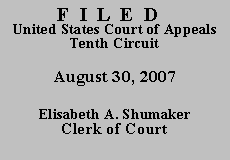

| BILLY JOE PRICE, |
|
| v. | |
| CLINT FRIEL, Warden, Utah State Prison, |
Mr. Price was sentenced on April 5, 1993, in Utah state court to an indeterminate term of five years to life imprisonment for first-degree murder. His petition for a writ of certiorari from the Utah Supreme Court was denied on April 9, 1996; and on May 12, 1997, the trial court entered an amended judgment of conviction nunc pro tunc, correcting Mr. Price's sentence with respect to a firearms enhancement. It appears from the record that Mr. Price did not seek certiorari review from the United States Supreme Court.
On September 26, 2005, Mr. Price filed his § 2254 application. The district court denied his application because it had not been filed within the one-year limitations period established by the Antiterrorism and Effective Death Penalty Act of 1996, 28 U.S.C. § 2244(d)(1). The court computed that the limitations period began to run on July 3, 1996, when Mr. Price's time for seeking review in the United States Supreme Court expired, see Rhine v. Boone, 182 F.3d 1153, 1155 (10th Cir. 1999); Sup. Ct. R. 13(1) (petition for writ of certiorari must be filed within 90 days of entry of judgment). It further found that even assuming that the limitations period had not begun to run until the trial court had entered its nunc pro tunc order in 1997 (or 30 days afterwards, when the time for seeking review by the Utah Supreme Court had expired), Mr. Price's 2005 application had still been filed over seven years after the limitations period had expired. Also, the district court denied equitable tolling. It rejected Mr. Price's contention that he had discovered new evidence showing that he was actually innocent, ruling that the evidence was not new because it had been available and known to Mr. Price before his trial.
"When the district court denies a habeas petition on procedural grounds without reaching the prisoner's underlying constitutional claim, a COA should issue when the prisoner shows, at least, that jurists of reason would find it debatable whether the petition states a valid claim of the denial of a constitutional right and that jurists of reason would find it debatable whether the district court was correct in its procedural ruling." Slack v. McDaniel, 529 U.S. 473, 484 (2000). Mr. Price does not, and could not, challenge the district court's determination that he failed to file his § 2254 application within the one-year limitations period. He does argue, however, that he has provided sufficient grounds for requiring equitable tolling. We disagree. Equitable tolling for habeas corpus relief may be available in extraordinary circumstances, such as when "a constitutional violation has resulted in the conviction of one who is actually innocent." Miller v. Marr, 141 F.3d 976, 978 (10th Cir. 1998). Prisoners asserting actual innocence must produce "new evidence" establishing that "it is more likely than not that no reasonable juror would have found petitioner guilty beyond a reasonable doubt." House v. Bell, 126 S. Ct. 2064, 207677 (2006).
Mr. Price contends that a psychological report finding him mentally incapable of forming the necessary intent for first-degree murder is new evidence of his actual innocence. We do not agree that this evidence is new. Mr. Price was told at the time of the psychological interview that a report of the evaluation would be made and sent to the court for use by both the prosecution and the defense. Although he may not have read its ultimate conclusion until well after trial, he certainly knew of the report's existence before trial.
Mr. Price also contends in this court that he did not discover until 2005 that his sentence had been amended in 1997, and that he filed his § 2254 application within one year of this discovery. But even if we assume that the one-year limitations period should be calculated from the 1997 amendment, his application was untimely by several years. And he fails to explain how not being aware of the sentence amendment caused him to delay filing his application.
Finally, Mr. Price argues that his application should not be barred by the one-year limitations period because Warden Friel waived an untimeliness defense. But there was no such waiver. The passage in Warden Friel's district-court brief upon which Mr. Price relies merely says that Mr. Price's claim of ineffective assistance of appellate counsel is not procedurally barred by failure to raise the claim on direct appeal in state court.
No reasonable jurist could debate the district court's conclusion that Mr. Price's application was untimely. We DENY a COA, GRANT his request to proceed in forma pauperis, and DISMISS the appeal.
ENTERED FOR THE COURT
Harris L Hartz
Circuit Judge